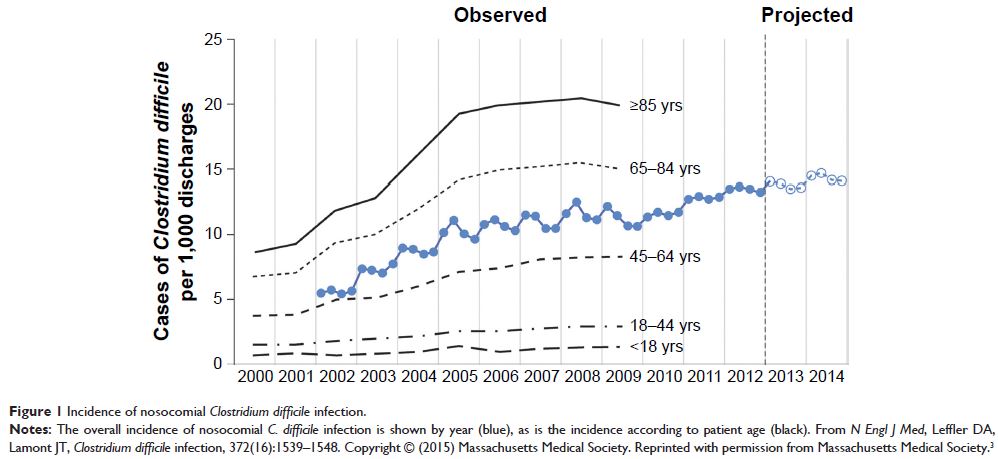108985
论文已发表
注册即可获取德孚的最新动态
IF 收录期刊
- 3.4 Breast Cancer (Dove Med Press)
- 3.2 Clin Epidemiol
- 2.6 Cancer Manag Res
- 2.9 Infect Drug Resist
- 3.7 Clin Interv Aging
- 5.1 Drug Des Dev Ther
- 3.1 Int J Chronic Obstr
- 6.6 Int J Nanomed
- 2.6 Int J Women's Health
- 2.9 Neuropsych Dis Treat
- 2.8 OncoTargets Ther
- 2.0 Patient Prefer Adher
- 2.2 Ther Clin Risk Manag
- 2.5 J Pain Res
- 3.0 Diabet Metab Synd Ob
- 3.2 Psychol Res Behav Ma
- 3.4 Nat Sci Sleep
- 1.8 Pharmgenomics Pers Med
- 2.0 Risk Manag Healthc Policy
- 4.1 J Inflamm Res
- 2.0 Int J Gen Med
- 3.4 J Hepatocell Carcinoma
- 3.0 J Asthma Allergy
- 2.2 Clin Cosmet Investig Dermatol
- 2.4 J Multidiscip Healthc

Clostridium difficile infection in the elderly: an update on management
Authors Asempa TE, Nicolau DP
Received 14 August 2017
Accepted for publication 19 September 2017
Published 24 October 2017 Volume 2017:12 Pages 1799—1809
DOI https://doi.org/10.2147/CIA.S149089
Checked for plagiarism Yes
Review by Single-blind
Peer reviewers approved by Dr Colin Mak
Peer reviewer comments 2
Editor who approved publication: Dr Richard Walker
Abstract: The
burden of Clostridium difficile infection
(CDI) is profound and growing. CDI now represents a common cause of health
care–associated diarrhea, and is associated with significant morbidity,
mortality, and health care costs. CDI disproportionally affects the elderly,
possibly explained by the following risk factors: age-related impairment of the
immune system, increasing antibiotic utilization, and frequent health care
exposure. In the USA, recent epidemiological studies estimate that two out of
every three health care–associated CDIs occur in patients 65 years or
older. Additionally, the elderly are at higher risk for recurrent CDI. Existing
therapeutic options include metronidazole, oral vancomycin, and fidaxomicin.
Choice of agent depends on disease severity, history of recurrence, and, increasingly,
the drug cost. Bezlotoxumab, a recently approved monoclonal antibody
targeting C. difficile toxin B, offers
an exciting advancement into immunologic therapies. Similarly, fecal microbiota
transplantation is gaining popularity as an effective option mainly for
recurrent CDI. The challenge of decreasing CDI burden in the elderly involves
adopting preventative strategies, optimizing initial treatment, and decreasing
the risk of recurrence. Expanded strategies are certainly needed to improve outcomes
in this high-risk population. This review considers available data from
prospective and retrospective studies as well as case reports to illustrate the
merits and gaps in care related to the management of CDI in the elderly.
Keywords: Clostridium
difficile , recurrence, risk factors, elderly, aging,
treatment, bezlotoxumab, fecal microbiota transplant
